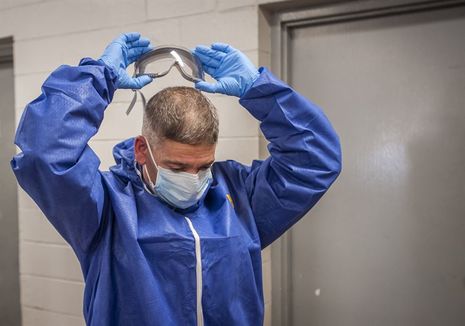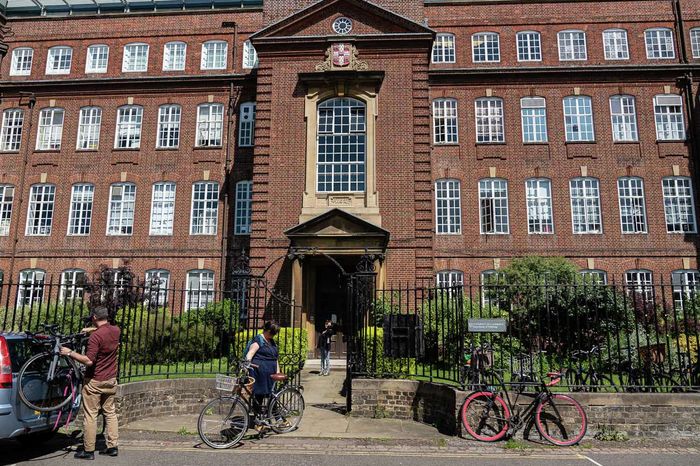Cambridge Living Wage Campaign issues demand for worker safety and pay transparency
The campaign accuses colleges of “negligence” and calls for an increase in “transparency around the protections put in place for staff and students during the pandemic”

The Cambridge Living Wage Campaign (CLWC) has today issued a statement calling on colleges to display a higher degree of transparency around worker safety and compensation during the coronavirus lockdown.
CLWC have demanded that colleges “take a more responsible approach to their employees during the quarantine period” amid claims that “multiple colleges” are “bringing what the campaign considers non-essential staff into colleges during a period where they could endanger their own lives, the lives of their families, and those of students still living in university accommodation”.
A press release from the group emphasised the importance of transparency in allowing workers to “know whether they’re being protected by their employers”. CLWC also described transparency as “critical in enabling students to stand in solidarity with workers”.
The Cambridge University Students Union (CUSU) led campaign states that it has “attempted to reach out to colleges for clear guidance on their definitions of essential workers”, whilst also inquiring if the personal protective equipment (PPE) provided to those still working within colleges is “adequate to protect workers against the virus”.
CLWC’s statement comes at a time of increased scrutiny of the government’s provision of PPE for those working in the health and care sectors.
The campaign group said it is essential for colleges to “prioritise the safety and well-being of their staff, students and fellows above all else” by providing essential workers with PPE when likely to be coming into contact with people potentially having or confirmed to have the virus.
They also called on the University and colleges to ensure workers on visas, who would normally be subject to NHS surcharge fees, are made aware that COVID-19 treatment and testing is free from these charges.
With regards to college staff who are not presently working, the CLWC claims eight colleges are yet to provide “students with any response on their [coronavirus employment] policy”, while others “have not indicated whether casual staff have been furloughed”.
Varsity has approached the colleges mentioned by CLWC for comment.
CLWC state they are in the process of gathering information from Jesus College. Some colleges have complained that they have not been given adequate time to respond to the questions or that they have not received any contact from CLWC.
Where colleges have described furloughing staff, CWLC state “it is often unclear why this has only been limited to some workers considering all are eligible under the government scheme”.
CLWC’s second set of demands, in light of this newly gathered information, revolves around pay; protecting the pay of workers, utilising the Job Retention Scheme where appropriate and requiring no employees will be made redundant during the pandemic or as a consequence of the pandemic.
The Job Retention Scheme, introduced by the Chancellor on March 22nd, ensures the government will pay 80% of the salary for workers who are kept on by their employer.
CLWC asks colleges to provide the additional 20% of staff’s normal wages which are not covered by the Job Retention Scheme. They deem this necessary as some workers may not be able to afford basic necessities without the supplementary 20%.
While some colleges, including Queens’ and Pembroke said they would top up wages for casual staff being furloughed, CWLC claimed that others had been less clear in their responses, suggesting this indicated “they will not top up the 80% of wages for casual staff that they are claiming from the Job Retention Scheme”
A representative from Darwin College responded to a request for comment in stating that the College's position had not been "accurately reported" in the release, adding that the College's current approach is "that we will pay those casuals employed by the College in full based on the government's calculations".
For these workers, they added that "the College will bear the cost of the difference (the 20%) not reimbursed under the government scheme. The College's student-run bar have taken their own different decision on this."
Trinity Hall stated that it had "no comment" on the press release.
CLWC stressed that these demands related to pay should also cover outsourced workers. If these conditions are not guaranteed for outsourced employees, CWLC believes the University and colleges should take action.
Reaffirming a call for transparency, CWLC stated that “although some colleges have been open and clear about their policies on protecting workers against financial insecurity and threats to their health in the COVID-19 lockdown, far too many have only given partial information or none at all.”
In a statement CUSU said, “It is unacceptable that many colleges are failing to cover 100% of staff wages during this difficult period. Wages for non-academic staff are already disgracefully low, and failing to maintain them risks putting college workers into increasingly precarious positions.”
They added that CUSU is “fully behind students and unions working to hold colleges to account over these important issues.”
Updated Wednesday 11.14am: This article was updated to include responses from Trinity Hall and Darwin College.
Updated Friday 11.14am: This article was updated to remove allegations made by CLWC where right of reply had not been offered prior to publication. Varsity apologises for the initial publication of these claims.
Updated Friday 9.18am: This article was updated to reflect that Jesus College is yet to receive an information request from CLWC.
 News / Judge Business School advisor resigns over Epstein and Andrew links18 February 2026
News / Judge Business School advisor resigns over Epstein and Andrew links18 February 2026 News / Gov grants £36m to Cambridge supercomputer17 February 2026
News / Gov grants £36m to Cambridge supercomputer17 February 2026 News / Hundreds of Cambridge academics demand vote on fate of vet course20 February 2026
News / Hundreds of Cambridge academics demand vote on fate of vet course20 February 2026 News / CUCA members attend Reform rally in London20 February 2026
News / CUCA members attend Reform rally in London20 February 2026 News / Union speakers condemn ‘hateful’ Katie Hopkins speech14 February 2026
News / Union speakers condemn ‘hateful’ Katie Hopkins speech14 February 2026











